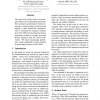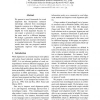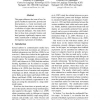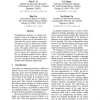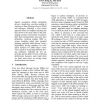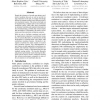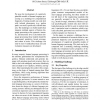ACL
2010
13 years 10 months ago
2010
We propose a novel algorithm for sentiment summarization that takes account of informativeness and readability, simultaneously. Our algorithm generates a summary by selecting and ...
ACL
2010
13 years 10 months ago
2010
The main focus of this work is to investigate robust ways for generating summaries from summary representations without recurring to simple sentence extraction and aiming at more ...
ACL
2010
13 years 10 months ago
2010
We present a novel framework for word alignment that incorporates synonym knowledge collected from monolingual linguistic resources in a bilingual probabilistic model. Synonym inf...
ACL
2010
13 years 10 months ago
2010
This paper addresses the issue of how linguistic feedback expressions, prosody and head gestures, i.e. head movements and face expressions, relate to one another in a collection o...
ACL
2010
13 years 10 months ago
2010
Distributional similarity is a classic technique for entity set expansion, where the system is given a set of seed entities of a particular class, and is asked to expand the set u...
ACL
2010
13 years 10 months ago
2010
Generating referring expressions is a key step in Natural Language Generation. Researchers have focused almost exclusively on generating distinctive referring expressions, that is...
ACL
2010
13 years 10 months ago
2010
Speech recognition affords automobile drivers a hands-free, eyes-free method of replying to Short Message Service (SMS) text messages. Although a voice search approach based on te...
ACL
2010
13 years 10 months ago
2010
Despite the existence of several noun phrase coreference resolution data sets as well as several formal evaluations on the task, it remains frustratingly difficult to compare resu...
ACL
2010
13 years 10 months ago
2010
We propose a corpus-based probabilistic framework to extract hidden common syntax across languages from non-parallel multilingual corpora in an unsupervised fashion. For this purp...
ACL
2010
13 years 10 months ago
2010
We pose the development of cognitively plausible models of human language processing as a challenge for computational linguistics. Existing models can only deal with isolated phen...

